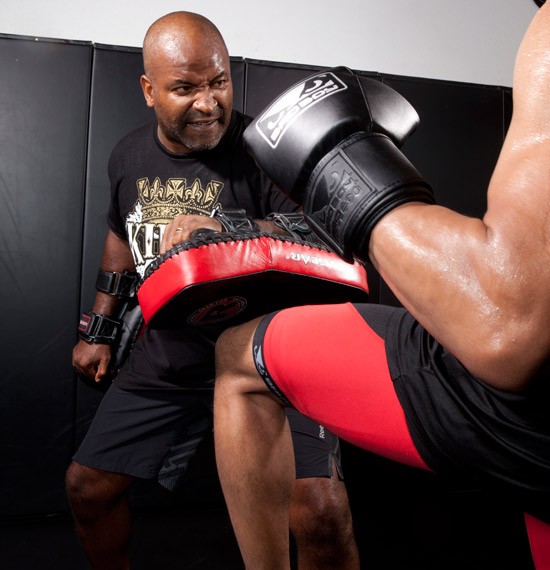
You spend your Friday mornings sipping a latte or getting into a Downward Dog? I've been spending them getting some good ol'-fashioned ass-whuppings.
For up to four hours a day, six days per week for the past three months, I've weathered the punches, kicks, knees, elbows, strikes, takedowns and workouts offered by the people who train at Kings MMA in Huntington Beach, the most important gym in the mixed-martial-arts (MMA) world right now, a place that has been creating champions the way USC used to produce Heisman winners. It's also a top-notch dojo for Muay Thai and jiu jitsu–a rare trifecta in an industry that's happy to smush in as many clients and classes as possible, damn the quality.
I recently gritted through another Friday cycle of sessions until there was just one left: jiu-jitsu, probably the least bruise-inducing fight style offered at Kings. Just two six-minute rounds of sparring, then a well-deserved break. I matched up with my sparring partner for the round, an amateur grappler whom I've rolled with numerous times before. Good guy–tough, but not ruthless.
Our round started the same way as it had dozens of times before–I got us in a neutral position, he tried to break it into a dominant one. A fake move by me to set up a sweep, and a recovery by him that broke my tired grip. A scrum ensued, with limbs flying everywhere.
And then he kneed me straight in the eye.
]
It's just a scratch, I told myself, as I continued scrambling for position. Then my head brushed up against my opponent. My eyebrow jiggled like a Jell-O mold straight from the refrigerator. And it fucking hurt.
“Hey, how's my eye look?” I asked while on top of him, hoping for good news. Nope.
“Oh, shit!”
I insisted on finishing the round, but my eye was already beginning to swell shut. By the time jiu jitsu professor Fernando Bettega looked at my eye, half of my face resembled the Elephant Man's. Bettega told me to put something cold on it, so I left the mat, grabbed a frozen water bottle out of the fridge and held it across the left side of my face, defeated.
Black eyes are never a nice thing, but they're a rite of passage at MMA gyms. As sparring continued, fighters and professors came by to admire the dark blotch overtaking my eye.
“Damn, that looks pretty!” a wiseacre said.
“That's gonna leave a mark,” another cracked.
Others made jokes, I think; my ears were still ringing. But it was all right: I finally had something to show for all those ass-whuppings.
Kings isn't one of OC's largest gyms. It's barely larger than an American Eagle mall store, located next to a doughnut shop and a guitar-repair place in a tired shopping plaza. While others hold more classes and have more students, by around 11 a.m. every Monday, Wednesday and Friday, dozens of the world's finest professional fighters train here, attracting amateurs, professionals, coaches and MMA fans. They're coming to learn “the Kings way” under Master Rafael Cordeiro, a Brazilian native who has created a fanatical following through his calm, supportive, no-nonsense approach to the sport. The “Master” moniker is an honorific, but it's apt: In just five years, Cordeiro has created an institution that is changing the sport and has helped to launch dozens of fighters. It's the only gym in the world with two current UFC champions.
But no matter who you are, or how many black eyes you've given (or gotten), Cordeiro starts his workouts the same–with a smile, a nod and five words: “Shin pads and MMA gloves.”
And then the Master begins to teach.
[
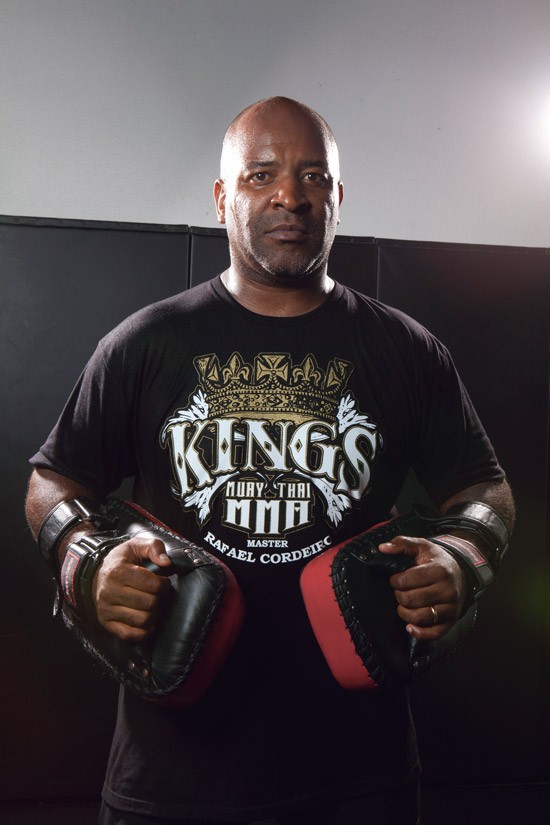
Fetty Wap's “Trap Queen” blares over Kings' speakers as Cristiane “Cyborg” Justino finishes an individual session with Cordeiro. The training will pay off; less than two weeks later, Justino successfully defended her Invicta FC featherweight championship belt by knocking out her opponent in 45 seconds.
But today, she's just a student. Cordeiro's soft voice whispers words of encouragement in Portuguese as she pounds the mitts, each blow popping the glove and echoing across Kings. She takes a brief water break and slaps hands with about a dozen other fighters gathering for an 11 a.m. class. Among the group is Brazilian legend Mauricio “Shogun” Rua, the former UFC light heavyweight champion; it's a month out from his hard-fought Fight of the Night win in Rio de Janeiro.
As soon as Cordeiro finishes with Justino, the rest of the fighters begin to jog circles around a large black mat. Hanging from the ceiling are flags representing the countries that Kings' students hail from. Cordeiro disappears to change into a different sleeveless T-shirt–still with the Kings MMA logo, of course, but red instead of navy. The fighters all know how to warm up without him, so he takes a minute to grab a drink and check in with his wife, Luciane, who runs the front desk.
“You are here three days a week,” Cordeiro says as the class begins. “Today is one of those days, and we are going to work.”
He launches into a lesson on the proper entrance for a takedown. “From a jab, hook or left kick, you have to change the level and finish from here,” Cordeiro says, demonstrating the movements as he explains them to his eager students. Soon, the fighters pair up with someone close to their size and skill level to work on technique and sparring.
For the next hour, Cordeiro casually strolls the mat. Sometimes, he hangs out in the corners to overlook everyone, but he's usually walking between the duos, correcting form and answering questions as he sees fit.
“Let's go, guys!” he shouts to the class, as a round is closing. “Watch your back!”
As the digital clock above the mat ticks down the seconds, Cordeiro shouts out the numbers.
“45 seconds!”
“30 seconds!”
“10 seconds!”
At this point, the fighters in the gym get a collective second wind, and each one closes out the round strong.
Cordeiro's coolness helps to offset the intensity of the workout and keeps any egos in check. In the coming weeks, camera crews will film Rua's training at Kings, but no one–not even Cordeiro–will change his or her style.
“I like the cameras from one side, but from the other side, I don't want to create arrogant guys here,” the 42-year-old Cordeiro says. “Once a guy thinks he's a star, he's done. You have to stay humble. I don't want to see fighters change the philosophy of the gym.”
He jokes about not wanting Kings “to turn into Rocky III, with all the cameras and lights” as several fighters thank Cordeiro as they leave. “These are people looking for masters, not coaches,” Cordeiro says. “It's a lot of knowledge and philosophy, not just technique and conditioning.”
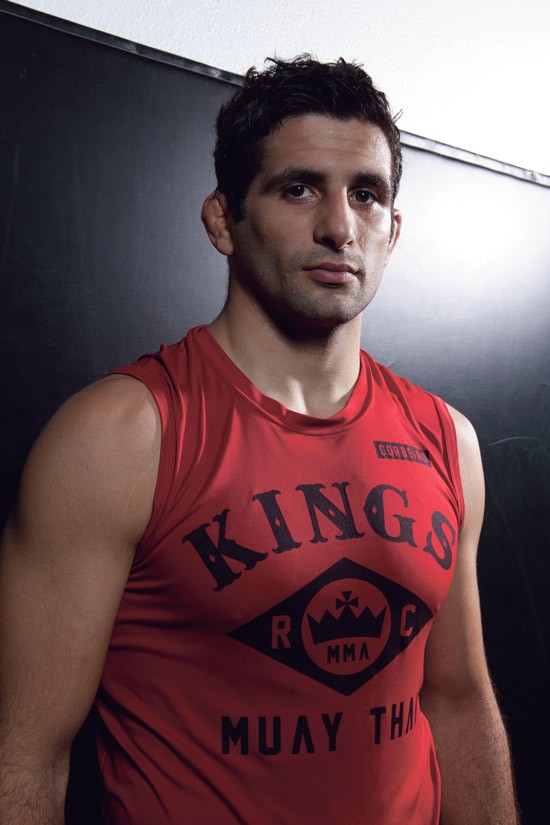
Cordeiro is one of the best instructors in the world, with a three-decade career that began in his native Brazil. But as 10th-ranked UFC lightweight Beneil Dariush sees it, Cordeiro's teachings help to skyrocket not only MMA careers, but also life outside of the cage.
“I can look to [Cordeiro] not just in training, but in any aspect of life,” Dariush says while getting in a light stretch after training some of Kings' younger fighters. “I can establish a mindset here of something bigger than me. [Cordeiro's] faith has strengthened my faith.”
Ricardo Testai, one of Kings' two champion Brazilian jiu jitsu professors, agrees. “A lot of MMA [gyms in OC] have coaches, but coaches change. You might have one coach one year and a new coach the next year. We don't have coaches; we have a master or a sensei and professors. It's like a family.”
Born in 1973 in the southern Brazilian city of Curitiba, Cordeiro began training martial arts from a young age. As a young man, Cordeiro joined Chute Boxe Academy, a legendary gym that has cranked out champions in multiple fight forms. As one of Chute's premier strikers, he made more than 50 trips to Japan for his own fights and those of his teammates. Cordeiro eventually became Brazil's Muay Thai champion, as well as an International Vale Tudo Championship (a Brazilian MMA tournament) winner as a lightweight.
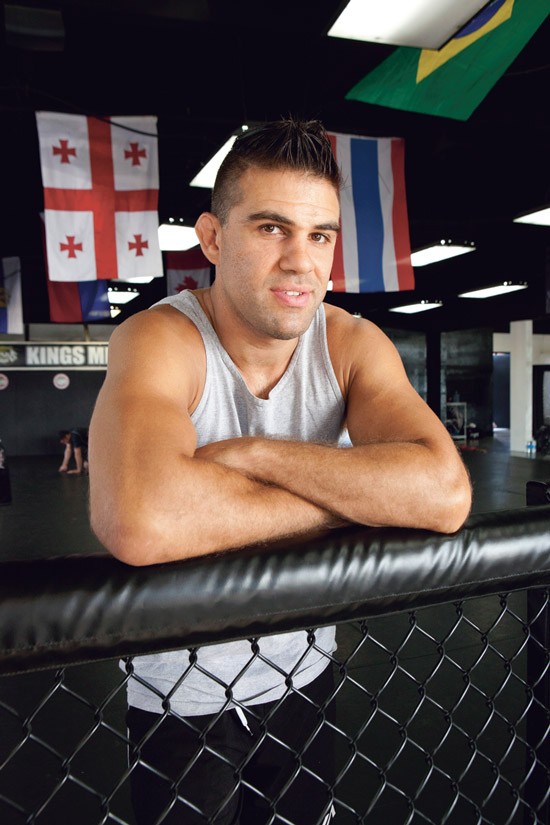
Upon retiring from his 13-year fighting career in his late 20s, he realized he would rather help other combatants improve their game rather than continue to put his body through the grind of being a professional fighter. So he switched from fighter to master. At Chute Boxe, he connected with Bettega, a black belt in both jiu jitsu and Muay Thai, just like Cordeiro.
“Even as a fighter, [Cordeiro] was a very good leader,” Bettega says. “The environment at Chute Boxe was so good; it was a nice time with a lot of very good fighters.”
With more than 300 students, Cordeiro was happy to be carrying on the legacy of the gym that had put his hometown on the worldwide martial-arts map.
“Chute Boxe was where I first learned what it took to teach,” Cordeiro says. “It was a gift from God.”
But something nagged at him. Martial arts were exploding in the United States, and Cordeiro needed a challenge. Dozens of his fighting peers had successfully opened gyms across America. So Bettega and Cordeiro decided to move to Orange County in 2007. “In Brazil, you hear that California is the best place to live in America and that Orange County is the best place to live in California,” says Testai, who moved to Irvine from Brazil in 2010 to teach jiu jitsu after working as a physical trainer for professional soccer players. “Brazilians love the beach, and there's enough money that people can afford the training. One guy goes and has a good job, so the next guy goes and opens a gym–not in the same place, but not too far.”

[
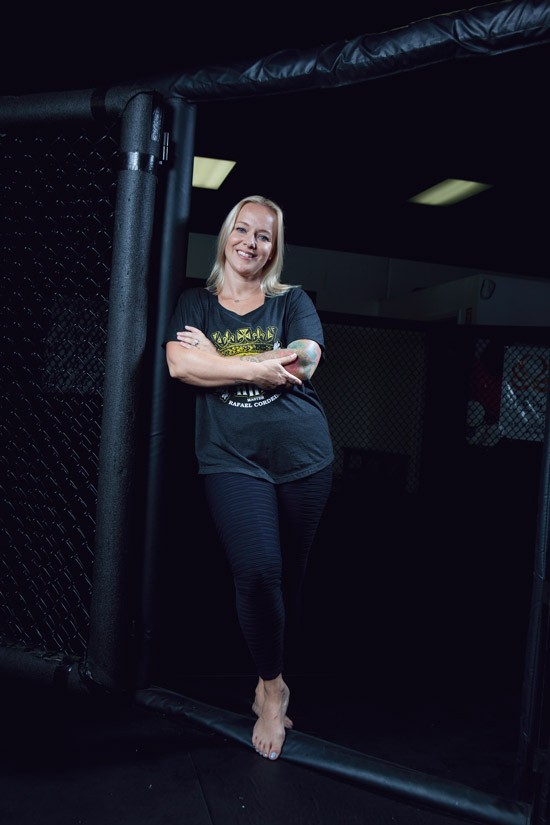
It's Monday, 1 p.m., and the gym is getting ready to close for a few hours before opening up again for evening classes, but there's still plenty of work. Luciane is pulling T-shirts out of boxes to be displayed on the wall for fighters and fans to buy. At the same time, three pro fighters bombard her with questions in Portuguese about paperwork for their upcoming bouts; Luciane nods, smiles and assures them that everything will be handled by the time they need it.
She films Cordeiro's workout-ending motivational speech, complete with reaction shots from his pupils. Luciane then checks to make sure the fighters did a good job of cleaning the mats, bathrooms and changing area.
“I'm the one who works the most because I don't want [Cordeiro] to lose his time and focus from the mat,” says Luciane, known to everyone as Lu. “I come in here every morning, and I first check the cleaning, but then I pray over this place. I wish God to bring all the good things. It's always show time here, and it's always a fun day.”
Luciane also deals with the regulars, the ones who want to bask at Kings. There's the bartender who trains in the morning after working well past midnight, the young wrestler studying to be an EMT, the former amateur boxer who finally admitted to himself MMA is replacing the sweet science and signed up with Kings–and that's just the morning crew.
Evening brings everyone from soccer moms to businessmen who change from their Hugo Boss wares into shin guards and leave their gym bags and briefcases on the racks in Kings' changing area. There are the three guys who began training with Testai around the same time years ago and are now some of the top purple belts in the gym; the amateur Muay Thai fighter who spends his days as a construction supervisor; and all the high school and college students with dreams of becoming UFC champions, the ones who geek out each time they realize a superstar is stretching next to them.
“She takes care of everything,” Cordeiro adds, looking at his wife from the bench seats next to the gym's front desk. “I'm the heart of the gym, but she's the soul. She takes care of the business.”
“He's very patient–very, very patient–and very positive,” Luciane says of her husband.
“Even the worst problems, he tries to see what is good in them. He's very calm and hard to irritate. If he gets mad, it's for a good reason. He would take his jacket off if he sees someone is cold.”
Kings MMA opened in 2010, after Cordeiro spent a few years training fighters in some of the area's existing gyms; the city is one of the capitals of the sport. But Cordeiro was unfazed. He and Bettega set out to re-create the magic of Chute Boxe Academy: a friendly atmosphere that revolved around teaching the discipline, respect and skills of various martial arts. Their respective Rolodexes allowed Kings to immediately attract top-tier fighters; the masses soon followed.
Students immediately accepted Cordeiro's Zen-like approach. In a sport stereotyped for overly aggro bros, the master is soft-spoken and almost always smiling. He admits he's not much of a screamer–not just because he feels it's unnecessary, but also because it gives him a headache.
“I like to have conversations with all of my fighters,” Cordeiro says. “It's the same as in a fight; I just talk with my guy. His adrenaline is so high that I need to keep him calm inside the ring. The same way we work here is the way we work in the ring.”
At Kings, Cordeiro began to refine the techniques he learned in Brazil. One of his most famous tactics is also seemingly the most obvious. Most coaches tend to get in the face of their students during training; Cordeiro instead stands the same distance away from his students during training as he will during fights. It teaches students to listen for his cues better. It is trademark Cordeiro: subtle, quiet, effective, perfect.
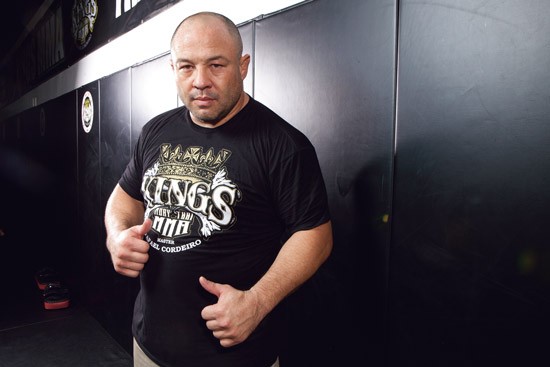
“His methodologies are genius,” says Jacob Harman, head wrestling coach at Calvary Chapel High and Kings' unofficial wrestling coach (when he's not training world-class grapplers for college and international tournaments). “He always uses the carrot instead of the bat. He moves students forward with encouragement.
“Anyone who has the privilege to be his student,” Harman concludes, “should consider it a blessing.”
As word spread of Cordeiro's talent, scrappers from across the world began making pilgrimages to Kings, even for just a session. Legends such as BJ Penn drop by when in the area, and former UFC light heavyweight champion Lyoto Machida has trained under Cordeiro. Plastered next to the entrance are photos of current UFC champions Fabricio Werdum and Rafael dos Anjos.
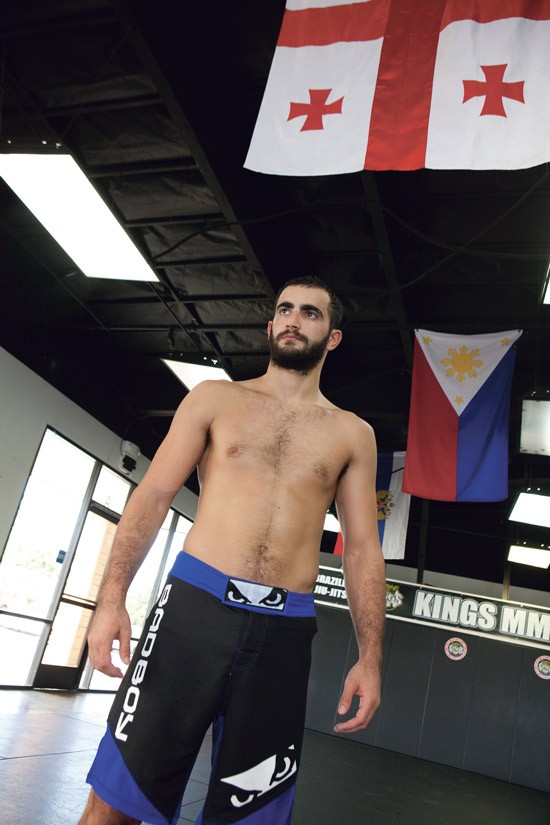
“I called here to see if I could come in, but it was holiday time, so no one answered the phone,” says Giga Chikadze, a fighter originally from the country of Georgia who's currently in one of the world's premier kickboxing promotions, Glory World Series. “On my last day here, Lu texted me back and said I could join sparring that day. I had partied the night before, so I was kind of nervous, but I came here and saw [Cordeiro] and smelled the gym and knew it was my home.”
Dariush began training at Kings shortly after the gym opened, just as his professional MMA career was beginning. “I also think a lot of guys don't realize that it's not just technique here,” says the 26-year-old. “You're going to make friends here. But you'll also get the best technique.”
Gabrielle Garcia is another example of Cordeiro's ability to grow fighters. She's a member of the International Brazilian Jiu Jitsu Federation Hall of Fame, but when she wanted to improve her striking game for an MMA career, she knew there was only one place to go. “Two years ago, I said I wanted to train with Master Cordeiro for a week,” Garcia says. “The first week was so hard; the feeling was terrible. In three months, he changed my game completely. Master Cordeiro is a good coach, a good guy and a good friend.”
[

Kings doesn't have quite as many MMA icons roaming around in the evenings, although a few do pop in. Dariush usually works on some extra striking in the advanced Muay Thai class. Dos Anjos drops by for rehab workouts under the supervision of Testai. And MMA god Wanderlei Silva can sometimes be found holding mitts for the children and beginners in the Muay Thai classes. When everyone else breaks for water, he heads over to check on the kids playing around in the cage–the daycare area of the gym.
This is the time for the public. Policemen and bartenders spend their free time choking out one another in jiu jitsu while teachers and businessmen relieve the day's stress with their elbows and knees in Muay Thai. Jiu jitsu brown belt LaRon Doucet works as a product trainer for Samsung.
“[Cordeiro] and Fernando [Bettega], they expect no nonsense, but they're still friendly,” Doucet says. “It's a very high level of talent, but it's very low-key. All of the professors here are personable and take a genuine interest in you. They'll always take the time to talk to you, but when it's time to train, it's serious.
“You can't come in here as a meathead and get away with it,” Doucet adds. “You'll get beat up here, and it'll either humble you or you'll leave.”
Though Kings is best known for MMA, the 6 p.m. advanced Muay Thai class is a reminder of its martial-arts roots. While most MMA gyms usually offer cardio kickboxing and beginner classes in the evenings for the after-work crowd, Kings attracts pros more than happy to help less-skilled people elevate their game.
Cordeiro isn't always at Kings in the evenings anymore–with his current travel schedule, he isn't always at Kings, period. So high-level pros take over the classes, all trained to teach Cordeiro's techniques and philosophies. Nevertheless, the master teaches when he can.
“More power!” Cordeiro commanded a dozen students recently, nearly all plebes. “Watch his footwork!”
“It's not just the technique, but his energy,” Luciane says. “We can feel when he's here versus when he's traveling.”
It would be easy for a lot of head coaches with Cordeiro's popularity to want to expand their empire into a marketable machine comparable to what the Gracies have with jiu jitsu, but he isn't interested in franchising unless every gym is run with the same standards.
“I want to open more schools, but only to spread the love of God and the Kings system,” Cordeiro says. “It is up to God. It wouldn't be possible without him.”
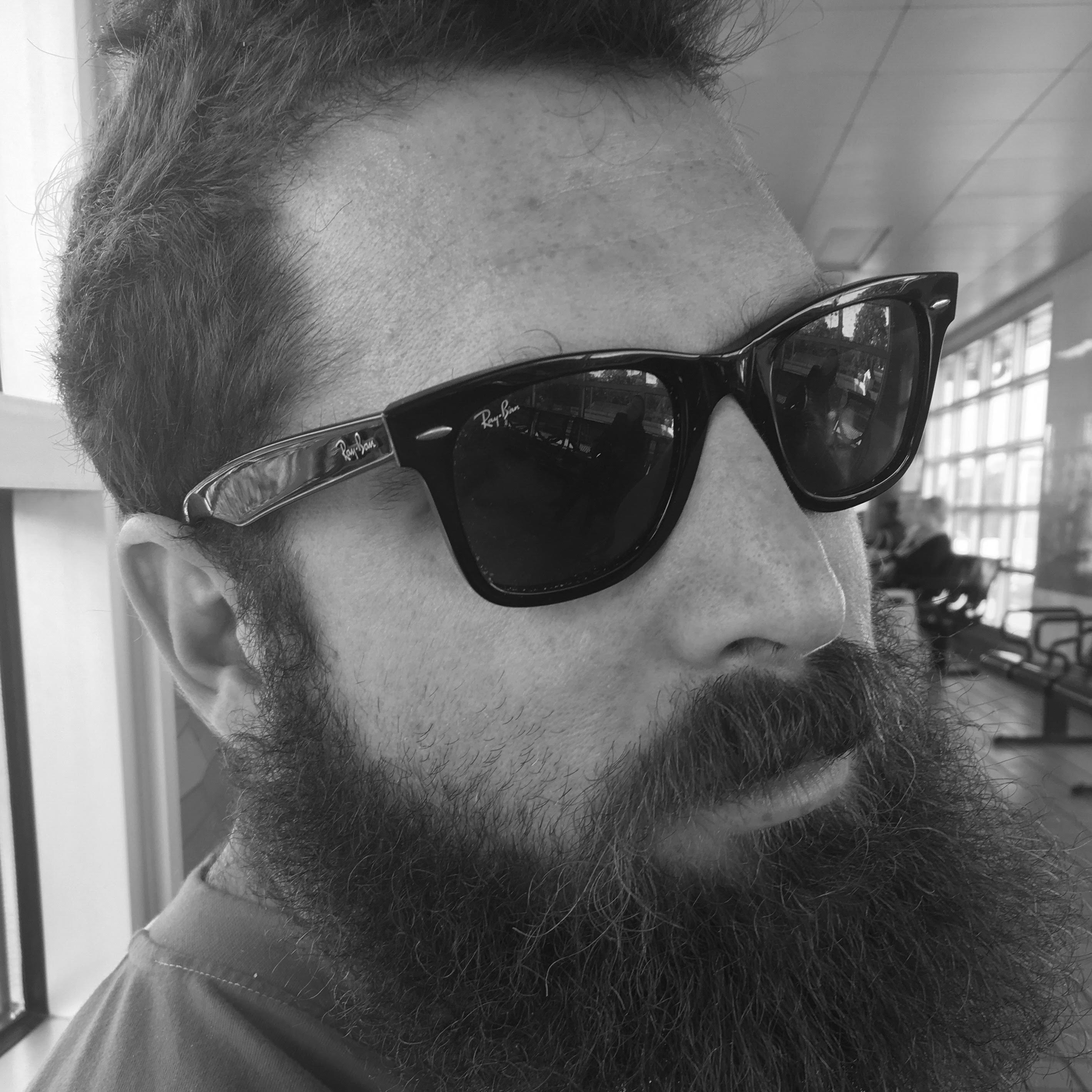
Josh Chesler used to play baseball for some pretty cool teams, but now he just writes about awesome stuff like tattoos, music, MMA and sneakers. He enjoys injuring himself by skateboarding, training for fights, and playing musical instruments in his off time.

